Outdoor Wellness Program
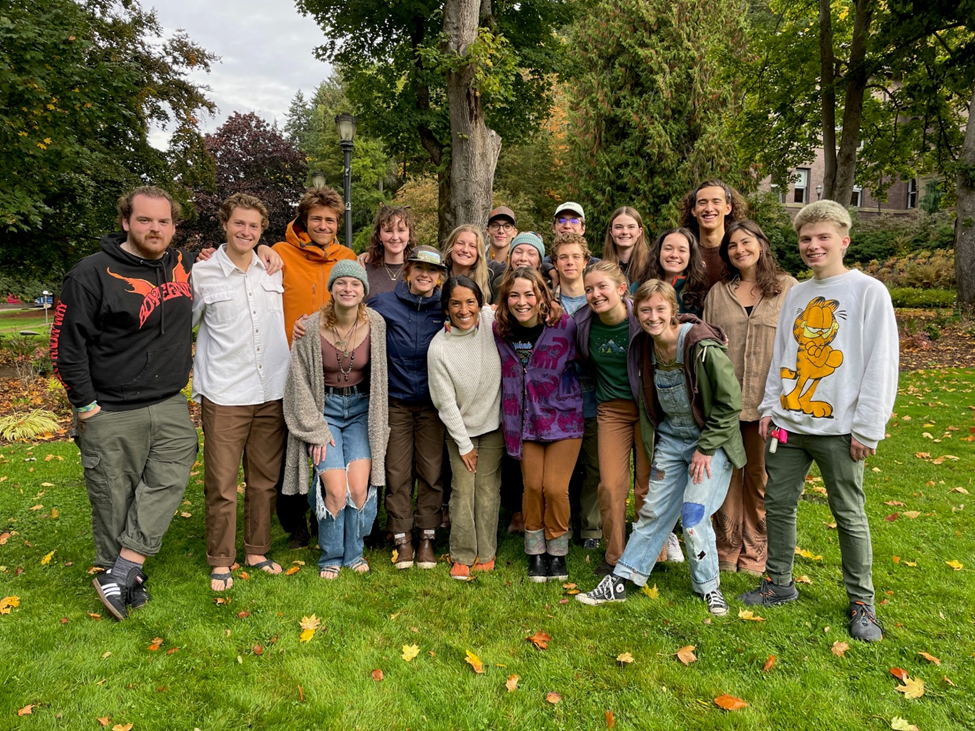
Developed by the Recreation Management & Leadership program, the A.S. Outdoor Center, and the Counseling and Wellness Center, the Outdoor Wellness Program pairs Western students with peer mentors who will work with participants during winter and spring quarters to create weekly nature-based experiences designed to boost their wellness. These experiences may support health maintenance, be used as prevention and/or help move individuals from surviving to thriving.
Become a Mentor!
The Outdoor Wellness Program began in spring quarter 2022. It is a collaboration between the Recreation Management and Leadership Program, the Outdoor Center, and the Counseling and Wellness Center.
At the heart of the Outdoor Wellness Program is a cohort of WWU students who serve as mentors to other WWU students, supporting them to regularly go outdoors to enhance their mental well-being and resilience.
Interested in being an Outdoor Wellness Mentor?
Please read through our FAQs and Class Schedule below to get a better idea of what our mentors do.
Apply to Be a Mentor!
Ready to become an Outdoor Wellness Mentor?
Apply now for the 2024-2025 cohort.
Attend an Info Session!
- 5/2/24: 12–1 PM in VU 462A
- 5/7/24: 12–1 PM in VU 462A
- 5/16/24: 12–1 PM in VU 462A
- 5/21/24: 12–1 PM in VU 462A
- 5/28/24: 5–6 PM in VU 567
As a Mentor you will:
-
Facilitate nature-based connecting experiences for self and peers through 1-1 relationships
-
Gain skills in therapeutic relationships, nature-based activities, mindfulness techniques and self-development
-
Participate in a growth-based community with other mentors
-
Experience serving and supporting others
-
Use as starting point for career, future academic pursuits, or passions
-
Regularly be outdoors
As an Outdoor Wellness Mentor, you must be able to commit to:
- Fall Quarter orientation (9/24, 9 AM–2 PM)
- Fall Quarter 3-credit class, Tuesdays 12–1:50 PM
- Winter Quarter 2-credit class, Tuesdays 11–11:50 PM, plus mentoring
- Spring Quarter 2-credit class, day and time TBD, plus mentoring
Unfortunately, this program will not be a good fit for you if you are unable to meet the time requirements. A commitment to attend the Fall Quarter class regularly will help provide a support network for you work with your mentee during the Winter and Spring. Additionally, weekly meetings with your mentee are an essential component to this program. It is expected that all mentors carve time out of their weeks for this to occur and it is helpful to think of it as a second-class period with timing that works within your and your mentee’s schedules.
Each week you will meet with your mentee for a nature connecting experience (90-120 minutes (about 2 hours) of time). This is something you and your mentee will get to collaboratively decide upon, and the sky is the limit! Within reason J. The activity can change weekly, or it can stay the same for the whole quarter. The goal is to find something that is both enjoyable and sustainable for both of you. The hope is to create a foundation of experiences that mentees can engage with long term after the program. Something they can do once a week or every day once the program has ended.
Good question! This is a nature-based experience that is focused on building a relationship with the natural world, your mentee, and having time to be self-aware and connect with yourselves. You do not need to come in with a ton of outdoor adventure skills. However, you do need a love of nature and willingness to be out in all kinds of weather year-round.
-
Must be accessible and sustainable: must be easily and routinely reached from a college campus by any student regardless of means.
-
Nature: Greenspaces which can include manicured urban parks, urban woods, and relatively undisturbed natural sites.
-
Activity: Can be active or passive
-
Time: 20-30 minutes three times a week and/or 90-120 minutes (about 2 hours) once a week.
Meredith, G. R., Rakow, D. A., Eldermire, E. R., Madsen, C. G., Shelley, S. P., & Sachs, N. A. (2020). Minimum time dose in nature to positively impact the mental health of college-aged students, and how to measure it: A scoping review. Frontiers in Psychology, 10. https://doi.org/10.3389/fpsyg.2019.02942
Nope! There is zero expectation that you will serve or act as a therapist. Your main job is to consistently get outdoors with your mentee and let nature do the work.
A general interest in being outside in whatever capacity is right for you is needed, as this is a program that is fundamentally based on the beneficial aspects of nature. We recognize and want to help expand what recreation has been and incorporate all interactions with nature and green spaces. If you do have technical skills or leadership/facilitation experience this might come in handy but is not required! It is important to recognize that your skills as a mentor do not directly drive the experience, but that the mentees' desires, capabilities and wants are at the forefront of choosing any given activity.
Nope! Part of the training provided for all mentors are foundational skills applicable in the mental health field. The intention behind offering skills/techniques within the mental health field are to support mentors as they engage in the class, sessions with mentees and anything that comes up. We know people might be coming into the class with different experiences and backgrounds connected to mental health, and we hope to provide a foundation of knowledge from which to pull from throughout your time in this program and beyond.
Potentially. And this is a grey area that will be explored or may come up throughout your time in this program. The goal will always be supporting the mentee and being a resource. Will you gain the associated benefits of being outside and engaging with nature? Yes, likely, and that should not be a driving force for your participation in this class.
RECR 397D Tuesdays 12:00–1:50
Class Description:
This course provides a hands-on opportunity to be trained as a peer mentor and serve other WWU students through 1-1 nature connecting experiences. Students in this course will be learning skills to work with “mentees” on a weekly basis during Winter and Spring quarter (2023) through the exploration and engagement in various nature based recreational activities.
Class theory, readings and perspectives will pull from critical pedagogy in ecopsychology, contemplative education practices, somatic psychology, and leadership studies to create a community centered learning environment.
Critical to this class will be creating new definitions and working models of what recreation and nature experiences can be, deconstructing the primary narrative surrounding the past/present of recreation, and examining individual/collective relationships to the natural world.
RECR 397D Tuesdays 11:00–11:50
Class Description:
This course provides a hands-on opportunity to serve as a peer mentor to other WWU students through one-on-one nature connecting experiences. In partnership with the Counseling Center students will work with “mentees” on a weekly basis, exploring and engaging in various nature based recreational activities.
Class meetings occur twice weekly; the first session will consist of all “mentors” exploring evidence-based practices, personal nature histories, theoretical foundations in counseling, mentorship and health and nature, and creating a supportive growth-based atmosphere. This will be 1 hour of class time per week. The second session serves as an independent learning time to meet 1-1 with your mentee and explore a nature connecting experience of your choosing. These weekly 1-1 mentee sessions are required and will meet for 120 minutes per week forming a critical foundation to this class.
Each student will receive an additional 15-30 minutes per week of direct supervision to support their relationship with their mentee. Lastly, there will be 1 hour of additional homework.
Class theory, readings and perspectives will pull from critical pedagogy in ecopsychology, somatic psychology, and leadership studies to create a community centered learning environment.
Critical to this class will be creating new definitions and working models of what recreation and nature experiences can be, deconstructing the primary narrative surrounding the past/present of recreation, and examining individual/collective relationships to the natural world.
RECR 397D Day/Time TBD
Class Description:
This course provides a hands-on opportunity to serve as a peer mentor to other WWU students through one-on-one nature connecting experiences. In partnership with the Counseling Center students will work with “mentees” on a weekly basis, exploring and engaging in various nature based recreational activities.
Class meetings occur twice weekly; the first session will consist of all “mentors” exploring evidence-based practices, personal nature histories, theoretical foundations in counseling, mentorship and health and nature, and creating a supportive growth-based atmosphere. This will be 1 hour of class time per week. The second session serves as an independent learning time to meet 1-1 with your mentee and explore a nature connecting experience of your choosing. These weekly 1-1 mentee sessions are required and will meet for 120 minutes per week forming a critical foundation to this class.
Each student will receive an additional 15-30 minutes per week of direct supervision to support their relationship with their mentee. Lastly, there will be 1 hour of additional homework.
Class theory, readings and perspectives will pull from critical pedagogy in ecopsychology, somatic psychology, and leadership studies to create a community centered learning environment.
Critical to this class will be creating new definitions and working models of what recreation and nature experiences can be, deconstructing the primary narrative surrounding the past/present of recreation, and examining individual/collective relationships to the natural world.
Due to the repeatability option of this course, students will be learning and practicing skills such as:
- active listening
- professional boundaries
- community resiliency model
- supporting and building student resilience
- crisis intervention
- goal setting
- assessment
- evaluation
Additionally, students will be given opportunities to learn about various mental health diagnosis and how nature-based practices can serve as forms of prevention and health maintenance with various disorders.
If students repeat the class to maintain their relationship with their mentee and continue to receive supervision and support from the instructor and the other students, they will be given more advanced readings and direction about how to deepen their learning on the above topics.
Are you interested in learning ways to connect with nature to enhance your mental well-being and resilience? Check out the Outdoor Wellness Program!
Nature connection has been shown to improve mental well-being and reduce symptoms of anxiety, depression, and ADHD, and the Outdoor Wellness Program is a fun way to take care of yourself and experience that connection, rain or shine!
Through a focus on well-being, and by focusing on relationships with self and the natural world, this program is intended for any current and curious Western student. The Outdoor Wellness program is not recommended as primary support for students currently in crisis, or with recent suicide attempts, serious eating disorders or chemical dependencies. Please consult with your primary healthcare practitioner if you would like to participate in the Outdoor Wellness Program and are navigating anything listed above.
Learn More
For more information about the program, click the link here to email a current Outdoor Wellness Staff Member.
Mentee Registration
Would you like to be matched with a mentor? Register here—the program runs Winter quarter through Spring quarter.
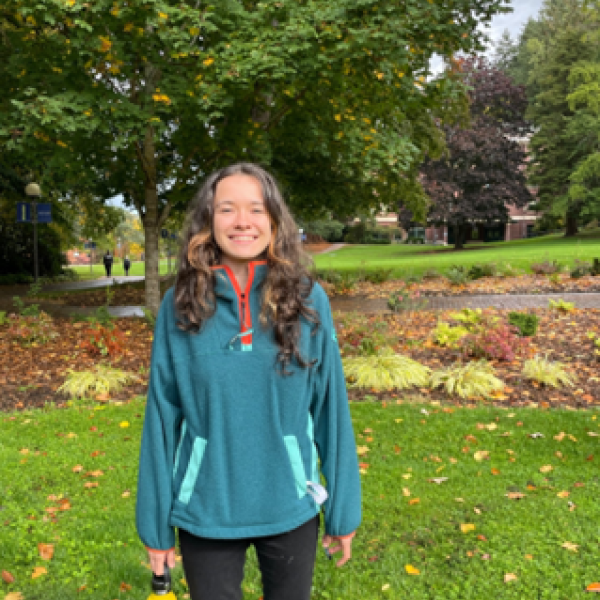
Alyssa
Hi! My name is Alyssa (she/her) and I am in my senior year at Western! I'm a Computer Science major and a part of the Climate Leadership Certificate program. I'm passionate about art and the outdoors, and excited to share the joys of nature with this community!
Alyssa (she/her)
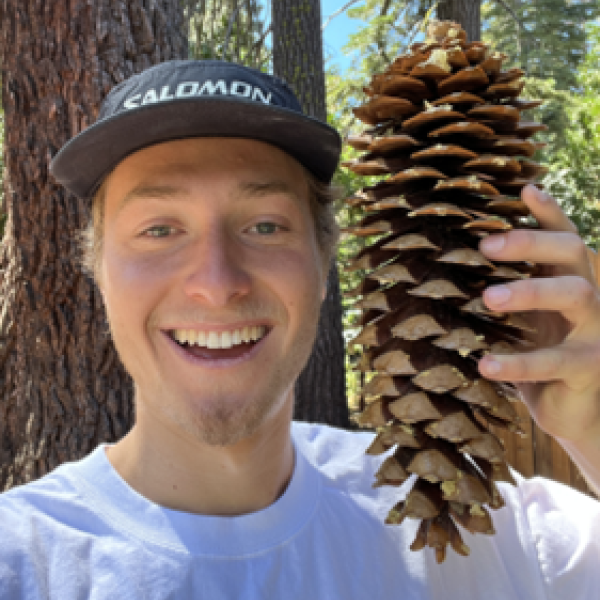
Björn
Howdy! I'm a senior at Fairhaven College studying the innate human connection to the natural world. I'm Northern California born and raised, and I have a strong relationship to my Swedish heritage. I'm happiest in the mountains and forests, and you can usually find me skiing, climbing, running, walking, painting, identifying plants, and/or meditating! I look forward to helping create intentional, constructive, and safe spaces in the outdoors.
Björn (he/him)
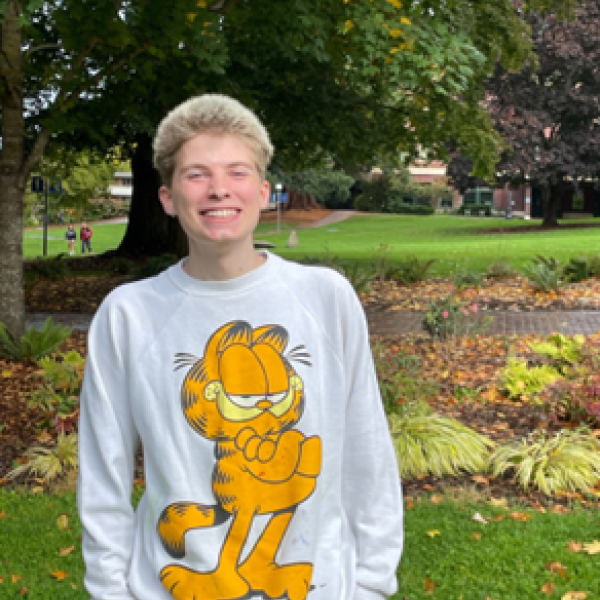
Demi
Hi, my name is Demi. I use They/Them and She/Her pronouns and I am currently in my 3rd year at Western. I am pursuing an interdisciplinary degree through Fairhaven College, as well as a minor in psychology. I grew up in the PNW, and I love hiking, being out in nature, and swimming in the warmer months. Looking forward to sharing my love of nature!
Demi (they/she)
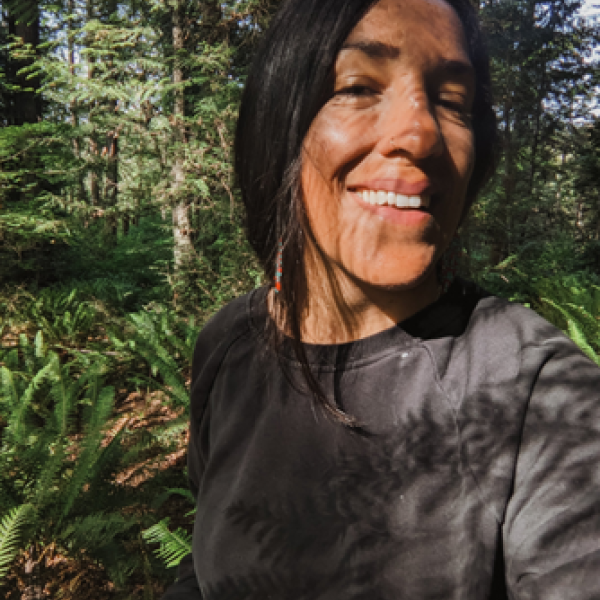
Felicia
Hi, Felicia here! I use she/her pronouns and am a Senior at Western. I also teach yoga and love swimming in the sea and hiking. I'm studying on the Fairhaven campus, designing a concentration around embodied approaches to trauma healing and resilience with a minor in psychology. A big part of my studies is art and nature therapy. I grew up in the South but call Coast Salish ancestral land home (aka Bellingham). I am thrilled to be part of the Outdoor Mentoring Program on campus and get outside with some lovely folks.
Felicia (she/her)
A Dream Becomes Reality
The Outdoor Wellness Program started as a dream of Ben Crandall, Viking Outdoor Recreation Program Coordinator in the Outdoor Center, in Fall 2021. Building off his work and academic study in Wilderness Therapy, Outdoor Recreation and Psychology, Ben, then a senior at Fairhaven College, hoped to bring all three disciplines together to offer an innovative, creative approach to addressing the mental health needs of the student body at Western. In doing so, his goal was to build on the growing body of evidence that suggests a connection between nature and mental health.
Program Philosophy
The philosophy of the Outdoor Wellness Program is grounded in the value and belief that humans are inherently part of nature. It is through this recognition and through embodied, nature-connecting experiences that we can become more whole, happy, and healthy in whatever personal form that takes for each and every human.
We recognize that by “prescribing” a certain amount of nature connecting time per week, as this program does, we continue the false divide between nature and humans. Given the broader landscape this program exists within—and that we as humans currently operate from—we know there is more work to be done and seek to bridge that supposed divide through intentional time in nature.
Created Through Collaboration
Ben's dream quickly turned into a reality after meeting with Lindsay Poynter, a Licensed Mental Health Counselor and faculty member in the Recreation Management and Leadership program, whose background is focused on mental health counseling, nature-based therapies, and teaching.
Together, Lindsay and Ben collaborated to create this first-of-its-kind program, through which peer mentors facilitate one-on-one, nature-connecting experiences to help address the growing mental health needs of our campus and use nature and peer-based support as the main avenues for change.
Over the course of Fall 2021 and Winter 2022, countless hours were spent designing curriculum, meeting with campus stakeholders, researching, creating nature-based connection plans, and, ultimately, designing a 3-credit class that launched Spring quarter 2022.
A Successful Launch
The first cohort of Outdoor Wellness Mentors arrived at the WWU Lakewood Facility in Spring 2022 for community building and an orientation to the program. Within a week they were being matched with their mentees and began spending one and a half to two hours a week outdoors together.
They watched sunsets, explored tide pools, walked through forests, mountain biked, created nature art, laughed, and sat in silence. It was a rapid time of growth and learning about how to hold space and support one another as well as experience the ways that being outdoors regularly reminds us to connect to our own true nature. Mentors and Mentees reported feeling calmer and more connected to themselves and each other. The biggest challenge of the quarter was that the Mentor orientation course happened at the same time the Mentors were thrown in the field to work with their Mentees.
Growth and Change
After the trial run in Spring 2022, we realized that having a full quarter to train Mentors prior to matching them with Mentees would be a more supportive model to use. So, the Fall 2022 cohort began with a full-quarter Mentor orientation, a 3-credit class, and then Mentors meeting their Mentees during January of 2023. These matches committed to work together for Winter quarter, with some continuing into Spring.
For those Mentees that either graduated or decreased time with their Mentors, we were able to create new matches for Spring Quarter. Additionally, we will be adding group outdoor experiences for current mentees, past mentees, and those still on the waiting list. We are excited to report how this goes and continue sharing how the program grows and changes both those who participate in it and those who teach it.